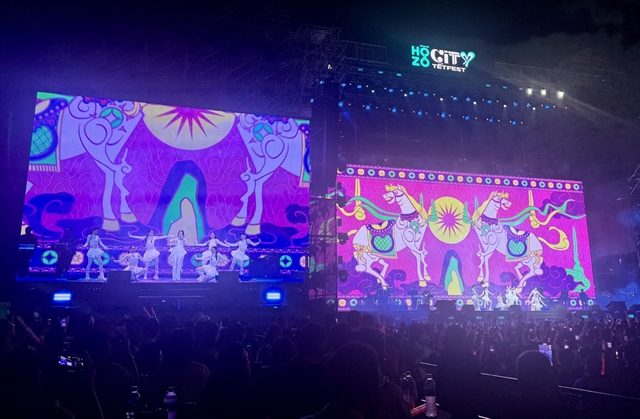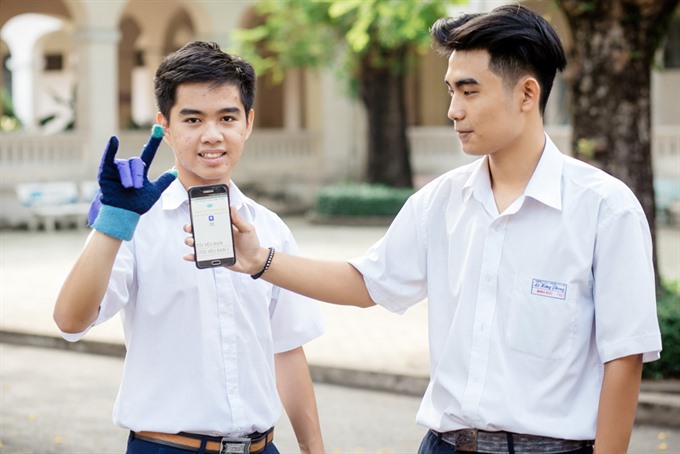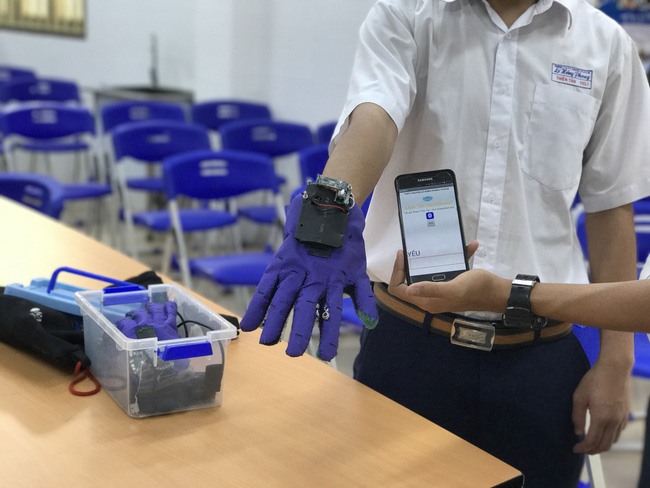 Features
Features

Two Vietnamese high school students come up with an invention that lends phonetic words to deaf and mute people
 |
| Listen to the hand: Tân (left) wears the talking glove that allows a smart phone to translate sign language into text and speech. The gesture says, "I love you." — VNS Photo Hữu Dương |
by Lê Ái
The gloved hands moved in thin air, in a pantomime that only those who know sign language could decipher.
However, these were no ordinary gloves. They could speak. “Tôi yêu bạn (I love you)", they said, conveying a core message to deaf and mute people from two students, Phạm Thiên Tân and Chử Hoàng Minh Đức, of the Lê Hồng Phong High School for gifted students in HCM City.
“When I tried to talk with the deaf and mute people, I discovered that I was communation-impaired myself. I did not understand the sign language that they were using, while most of them could understand what others were saying by reading mouth movements,” said 17-year-old Tân.
“I felt really uncomfortable just a few hours after living as a ‘deaf’ person. I wondered about the language barrier between the deaf and mute people and those who do not understand sign language.”
Obsessed by this barrier for days, Tân and one of his classmates, Đức, came up with the idea of a glove that is capable of converting sign language into spoken Vietnamese. This would help normal people to understand the language of the deaf and mute people and remove an invisible linguistic barrier.
Tân and Đức’s initiative recently won the highest award for high school students in the south at the Viet Nam Science and Technology Fair.
Smart solution
The solution that the two high school students came up with involved a glove and a smart phone. The glove is attached with a Flex Sensor and an MPU6050 sensor.
When the wearer uses the sign language, the sensors will read the movements of the hand, and transmit the data to the phone via an application based on the Android system. The phone screen will display the characters, texts and sounds based on the data.
The sounds that the phone utters now is the sweet and young voice of a female student who is a member of the science club at the Lê Hồng Phong High School for gifted students .
 |
| Saying things:Tân and Đức have successfully transcribed 31 hand movements into sounds and speech on the phone. — VNS Photo Hữu Dương |
Tân and Đức have so far successfully transcribed 31 hand movements into sounds and speech on the phone. Besides the alphabet, the glove can also ‘speak’ many words and phrases, including “I love you”, “I”, “You”, “Việt Nam”, “Hello”, “Parents”, and “Love”.
The young “scientists” are planning to write more codes to arrange the words in a sentence properly, and on connecting two gloves to make a full sentence on the smart phone in the near future.
Both Đức and Tân has gained a much better understanding about sign language. “Sign language is actually very simple. They just use key words in the sentences and shorten the sentences as much as possible,” Đức said
Tân said the “speaking” glove is similar to the Google Translate tool, in that it helps the users “translate” the sign language into Vietnamese speech; however, it cannot be 100 per cent correct.
“As students majoring in physics, both of us are interested in controlling the chips. The science club of our school is where Đức and I can engage in our passion for inventing new things,” Tân said.
“One day, by chance, I learned about a glove that can be used to control robots. I asked myself: why not apply the principle of reading hand movements of this glove into translating sign language. That’s how this happened.”
The two friends started working on the “speaking” glove in last August, and “finalized” the product last month, just one day before their examinations, after many sleepless nights.
However, they are not sure when they can finish the linguistic system for the glove, for it is something that requires constant updates.
Keeping it practical
“The process of creating a scientific product has to stop on reaching some stage, because the creator himself lacks the knowledge to carry on with the project. So far, we are continuing to study and absorbing knowledge essential for improving our product,” Tân said.
“We cannot foretell anything about the future, but we wish to introduce our product to the market or transfer the technology to other researchers who can continue to develop it and make it a really useful product for deaf amd mute people," he said.
Đức said that half way into their work, they found that their idea coincided with that of an American youth, but they also found their creation also had its own strengths that was an improvement.
The glove created by Đức and Tân can directly interact with a smart phone, a popular means of communication that everyone can possess, instead of connecting with a central computer via bluetooth, a pretty costly device that not everyone knows how to use.
According to Võ Mạnh Hùng, physics teacher at the Lê Hồng Phong High School, Đức and Tân’s talking glove has high applicability because it uses Vietnamese and prioritises Vietnamese users. Also, it is flexible in that one glove can be used by different people.
However, the two young men had to overcome quite a few challenges to finish making their glove in time for the Viet Nam Science and Technology Fair.
“In terms of technology, the more we work, the more we felt deficient. Many components broke down, and they were not cheap, so we had to be very careful,” Đức recalled.
“We also faced many linguistic difficulties in presenting our product in public. Fortunately, we received great support from our school in improving our expression and presentation through several rounds of the Viet Nam Science and Technology Fair.”
The talking glove is not their first creation. Earlier, Tân and Đức had collaborated to make other products like a machine to measure alcohol levels and an astronomical telescope.
The first prize in the Viet Nam Science and Technology Fair has only fuelled their aspirations. They dream of attending top-notch scientific and technological centres in the world where they can take their scientific passion to greater heights. VNS




